#François Dumont
Text
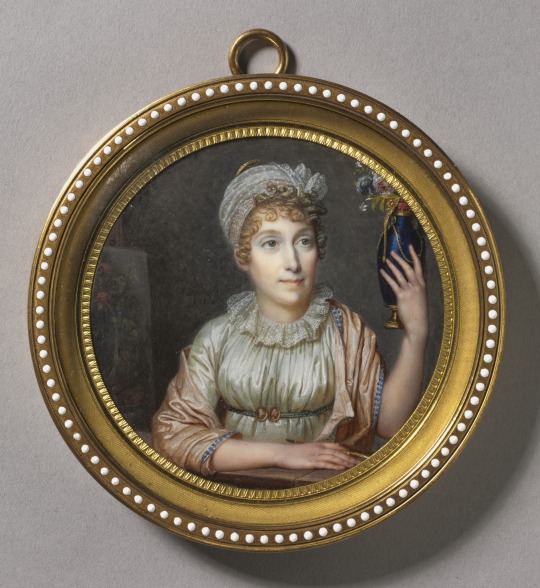
Portrait of Anne Vallayer-Coster by François Dumont
French, 1804
watercolor on ivory in a gilt metal and enamel frame
Cleveland Museum of Art
#portrait#Anne Vallayer-Coster#Anne Vallayer Coster#miniature#François Dumont#French#neoclassicism#watercolor#Cleveland Museum of Art
20 notes
·
View notes
Text

François Dumont (French, 1751-1831)
Portrait of a Woman at a Harpsichord, ca.1788
The Cleveland Museum of Art
#François Dumont#french#french art#european art#classical art#traditional art#art#aesthetic#aestethic art#fine art#europe#european#oil painting#fine arts#europa#mediterranean#portrait of a woman at a harpsichord#harpsichord#woman#powdered hair#piano#women in art#female portrait#female#portrait#1700s#black eyes#dark brown eyes#brown eyes
20 notes
·
View notes
Text

Miniature, ca. 1788, French.
By François Dumont.
Featuring a Woman in a Blue Dress and White Hat.
Cleveland Art Museum.
#cleveland art museum#miniature#womenswear#dress#18th century#1788#1780s#1780s France#france#French#françois dumont#hair#hat
25 notes
·
View notes
Photo

Self-portrait miniature by François Dumont (1751-1831)
3 notes
·
View notes
Text
Kolektif – Modernleşme Sürecinde Osmanlı Kentleri (2024)
‘Modernleşme Sürecinde Osmanlı Kentleri’, imparatorluğun kritik kentlerine farklı açılardan yaklaşan, ama yolları günün sonunda devlet müdahalesi ve değişim mevzuunda kesişen on incelemeyi bir araya getiriyor.
İdari anlayışın, dini yapılanmaların, modernleşmenin, yangınların, salgınların, halk sağlığının ve çatışmaların kent dokusu üzerindeki etkisine hasredilmiş olan bu incelemelerde İstanbul,…

View On WordPress
#2024#Alfa Yayınları#Ali Berktay#François Georgeon#Modernleşme Sürecinde Osmanlı Kentleri#Paul Dumont
2 notes
·
View notes
Photo

The Worst Ones (Les pires), Lise Akoka and Romane Gueret (2022)
#Lise Akoka#Romane Gueret#Elénore Gurrey#Mallory Wanecque#Timéo Mahaut#Johan Heldenbergh#Esther Archambault#Loïc Pech#Mélina Vanderplancke#Matthias Jacquin#Angélique Gernez#Dominique Frot#François Creton#Eric Dumont#Albertine Lastera#2022#woman director
6 notes
·
View notes
Text
Régine Deforges (1935-2014)
Het is al tien jaar geleden dat de Franse schrijfster Régine Deforges op 78-jarige leeftijd is overleden aan een hartaanval. Zij werd vooral bekend met de romancyclus De blauwe fiets waarvan sinds 1983 zo’n tien miljoen boeken zijn verkocht. Mijn vrouw, die graag boeken van lange adem leest, heeft van deze trilogie genoten (het boek is ook verfilmd met Laetitia Casta in de hoofdrol), maar zelf…
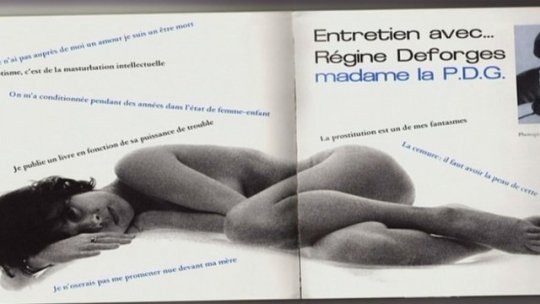
View On WordPress
#André Pieyre de Mandiargues#François Mitterand#Karen Vanparijs#Louis Aragon#Margaret Mitchell#Mikhail Gorbatsjov#Monika Dumont#Nicki de Saint-Phalle#Pauline Réage#Régine Deforges
0 notes
Text

A miniature of Marie Antoinette with her children Marie-Thérèse and Louis-Joseph by François Dumont. From the collection of Waddesdon Manor.
#marie antoinette#french history#18th century#marie therese charlotte#louis joseph#art#paintings#I'm in love with this ahh.
90 notes
·
View notes
Text

Laurent Cantet
French film director who won the Palme D’Or at the Cannes film festival with his improvisatory education drama The Class
The social-realist boom in 1990s French cinema produced compelling new voices such as Jacques Audiard, Bruno Dumont and Érick Zonca. The most humane and rigorous of that group was Laurent Cantet, who has died aged 63 after suffering from cancer.
Cantet, who often worked in an improvisatory mode with non-professional actors, won the Cannes film festival’s top prize, the Palme d’Or, for his education drama The Class (Entre les Murs, 2008). Sean Penn, president of that year’s Cannes jury, called the film “a miracle, a perfect movie, just so exciting to see. We walked into the jury room afterward and it was like we had swept up the floor and our work was done.”
A kind of Parisian Prime of Miss Jean Brodie, it was arrived at by cross-pollinating drama and documentary to create what Cantet called “documented fiction”. François Bégaudeau, author of the autobiographical novel Entre les Murs (Between the Walls, 2006), on which the film is based, plays a version of himself: an enthusiastic inner-city teacher who inspires his adolescent pupils but also crosses swords with them.
In one scene, François is taken to task over his use of anglicised names in his mathematical exercises: Bill has 12 apples, Bob has three, but what about, say, Rachid or Aïssata? This playful scene plants the seed for one of the film’s main themes – the use of language to gain leverage, and to reshape the world.
The movie’s sharp-eyed visual style lends these semantic wrangles a strong cinematic dimension. Shooting on location with three high-definition cameras, Cantet achieved an omniscient documentary effect. “This gave us a lot of freedom, allowing us to improvise, to capture the energy of the pupils rather than interrupt them when we wanted a different angle,” he explained. The students and staff in the film, who were all drawn from Françoise Dolto junior high in the 20th arrondisement of Paris, generated many of the scenes in collaboration with Bégaudeau and Cantet.
The movie’s overall tone is one of bruised idealism. “It shows the richness of multiculturalism rather than its weaknesses,” said Cantet. “The film is utopian about the possibilities this kind of setting offers, but pessimistic about the school system in general.”
The Class received an Oscar nomination and became Cantet’s most successful film. But the three features that preceded it were more impressive, withholding even the smallest spoonful of sugar to help their messages go down.
He made his debut in 1999 with Human Resources (Ressources Humaines), in which a business-school graduate starts a management job at the factory where his father is a welder. The newcomer clashes with the union at first, then has a change of heart when he learns of planned redundancies.
That film, which the critic Ginette Vincendeau called “generous, sensitive and innovative”, addresses with Loachian fastidiousness the challenge of reconciling principles and productivity. Both Human Resources and Cantet’s 2001 follow-up, Time Out (L’emploi du Temps), explore how work defines us even in our most interior moments.
Time Out concerns the middle-aged, middle-class Vincent (Aurélien Recoing), who conceals his unemployment from his wife and children, and instead lets his days drip by in service stations and motel lobbies. To retain his role as breadwinner, he cheats cash out of gullible investors he meets on the road.
The film was inspired by the case of Jean-Claude Romand, who lied about his non-existent job, and finally slaughtered his family. Cantet and his regular co-writer and editor Robin Campillo (who later became a director in his own right) stopped short of such horror. “We wanted him to have a disconcerting banality,” Cantet said. “He’s just someone who slips and trips down a certain pathway.”
Some audiences found a note of hope in the final scene, in which Vincent attends a job interview. Cantet was quick to scotch that reading. “The notion of work is so full of wealth and worthiness that the prospect of Vincent finding employment again is obviously a winner,” he said. “But not having a job can be of a certain wealth, too. For people like him, work can only be slavery, so to see the last scene as a happy ending is a denial.”
Heading South (Vers le Sud, 2005) applied Cantet’s usual scrutiny to a different milieu, albeit one still steeped in exploitation and commodification. Charlotte Rampling and Karen Young play sex tourists at a Haitian beach resort in the late 1970s who find themselves competing for the same 18-year-old gigolo (Ménothy Cesar). Neither woman is interested in the young man’s plight under the corrupt regime of President “Baby Doc” Duvalier, though eventually the country’s political strife eclipses their feud. The film has a starkly Fassbinderesque view of the intersection between sex, money and power.
Cantet was born in Melle, a town in western France, and raised in nearby Niort. His parents were both teachers. He attended university in Marseilles, then studied at the Paris film school IDHEC (L’Institut des Hautes Études Cinématographiques), where he met Campillo. Their first full-length collaboration, Les Sanguinaires (1997), was made for French television as part of a project looking ahead to the new millennium. (Human Resources was also made for TV, but earned an international cinema release.) Asked about the 13-year gap between graduating and directing Les Sanguinaires, he said: “I spent a long time trying to discover what I wanted to say in a film.”
Reactions to the movies he made after The Class were mixed. An adaptation of Joyce Carol Oates’s 1950-set novel Foxfire: Confessions of a Girl Gang (2012) met with muted acclaim. Return to Ithaca (2014), about a reunion of five friends in Havana, made few waves. It was Cantet’s second project in the city: he was one of seven directors who contributed to the portmanteau project 7 Days in Havana (2012). It was part-funded by Havana Club rum, which features prominently on screen.
His 2017 drama The Workshop (L’Atelier), about the relationship between a female teacher at a summer writing school and a male teenage student radicalised by the far right, revived the simmering tensions of Heading South, and represented a real return to form, though in fact the film had been gestating for more than 15 years. Cantet’s final picture, Arthur Rambo (2021), was inspired by the real-life case of Mehdi Meklat, and follows a young writer from the banlieues whose career is wrecked by offensive social media posts that predate his fame. He was working on a new film, The Apprentice, at the time of his death.
“My characters are never heroes,” Cantet said in 2008. “They always have weaknesses. That’s what motivates me to write them. They are people looking for their place in society: a place which is much harder to find when you don’t march in step with the rest of society. It’s something I can recognise in myself: keeping the world at arm’s length. Perhaps making films is a way of making up that distance.”
🔔 Laurent Cantet, film director, born 11 April 1961; died 25 April 2024
Daily inspiration. Discover more photos at Just for Books…?
6 notes
·
View notes
Photo

DUMONT, François
Portrait of a Lady as Hebe
c. 1797
Watercolour and bodycolour on ivory, ormolu frame, diameter 79 mm
Private collection
55 notes
·
View notes
Text
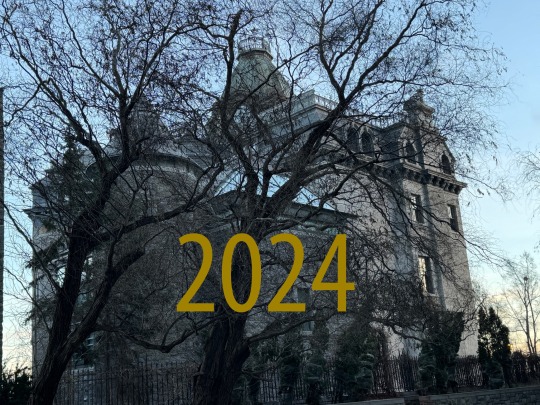


PRÉDICTION POUR L'ANNÉE 2024-
Il est traditionnel de commencer une nouvelle année avec des prédictions...
Je m'avance à en faire trois pour 2024!
1. Donald J. Trump sera réélu Président des États-Unis le mardi 5 novembre 2024;
2. L'Intelligence artificielle s'installera au centre de notre vie quotidienne pour devenir totalement incontournable;
3. Le travail à domicile continuera de dominer la vie économique et les espaces à bureaux devront changer de vocation.
Il est évident que l'élection de Donald Trump, si elle se réalise, ne sera pas active avant janvier de 2025, mais l'échiquier politique prendra toute sa forme en 2024, et ce pour influencer la politique mondiale jusqu'en 2030, soit jusqu'à la fin de la présente décennie.
Selon-moi, le monde sera polarisé plus que jamais en 2024 et après. Le pouvoir sur la planète sera divisé en quatre grandes parties, chacune incontournable.
On peut présumer que Vladimir Poutine sera le Président de la Russie jusqu'en 2030 et pour cette raison, la Russie et la Chine avec leurs alliés d'un bord deviendront les plus influentes; les États-Unis repliés sur eux-même formeront le deuxième pôle, tandis que l'Europe formera un troisième pôle mondial. Il restera ensuite un quatrième pôle politique, isolé des trois autres, mais significatif en puissance militaire, soit celui des pays comme l'Iran, la Corée du Nord et ses alliés.
Israel devra s'accrocher à l'un des pouvoirs de la planète, car aucune survie ne sera possible en dehors des quatre pôles mondiaux.
Pour la prochaine année, en ce qui concerne le Canada, la popularité grandissante de Pierre Poilièvre ramène la possibilité à venir d’un style de gouvernance à la Stephen Harper, après l’élection d’octobre 2025, si Justin Trudeau attend à la date limite d’une élection canadienne. Rappelons qu'il est minoritaire et que sa survie dépend entièrement de l'appui du NPD.
Au Québec, François Legault n’a pas à déclencher d’élection générale avant octobre 2026, soit pas avant trois ans. Il faudra voir si les autres partis deviennent d’ici là des alternatives viables, ce qui n’est pas le cas présentement malgré la très forte baisse de popularité de Legault et la grande popularité de Paul St-Pierre Plamondon. La popularité de Plamondon est cependant trop en avance de l'élection, car les Québécois votent généralement selon le climat politique qui précède l'année avant le vote. Plamondon me fait penser à Mario Dumont en 2007 alors que les sondages le projetaient premier ministre, mais qui avait échoué, de justesse, malgré ses 41 sièges face à Jean Charest qui avait remporté 48 sièges de député. L'handicap de Plamondon, qui a une personnalité très attachante, sera la séparation du Québec, un but politique qui n' a jamais été accepté par la majorité des Québécois.
C'est évidemment à suivre, et je me trompe, parfois...
Pour le moment en ce 1er janvier, je vous souhaite à toutes et tous une bonne année 2024! Beaucoup d’amour, et surtout le bonheur de vivre!
2 notes
·
View notes
Note
3, 6, 10, 22, 24, 27, 28
3. Any old school favorites (pre-70s)?
A very broad question. To mention some:
"Shanghai Express" dir. Josef von Sternberg
"The House Is Black" dir. Forough Farrokhzad
"Cléo from 5 to 7" dir. Agnès Varda
"The Trial" dir. Orson Welles
"The Hitch-Hiker" dir. Ida Lupino
"The 400 Blows" dir. François Truffaut
"Rocco and His Brothers" dir. Luchino Visconti
"The Red Shoes" dir. Michael Powell and Emeric Pressburger
"The Third Man" dir. Carol Reed
"Double Indemnity" dir. Billy Wilder
"Ajantrik" dir. Ritwik Ghatak
"Bicycle Thieves" dir. Vittorio De Sica
"Pather Panchali" dir. Satyajit Ray
"Viridiana" dir. Luis Buñuel
"Accattone" dir. Pier Paolo Pasolini
"Black Girl" dir. Ousmane Sembène
"Uski Roti" dir. Mani Kaul
"Black God, White Devil" dir. Glauber Rocha
"I Am Cuba" dir. Mikhail Kalatozov
"The Hand" dir. Jiří Trnka
"The Fireman's Ball" dir. Miloš Forman
"Daisies" dir. Věra Chytilová
"Meditation on Violence" dir. Maya Deren
"The Battle of Algiers" dir. Gillo Pontecorvo
"Andrei Rublev" dir. Andrei Tarkovsky
"Shadows of our Forgotten Ancestors" dir. Sergei Parajanov
"Boy" dir. Nagisa Oshima
"Persona" dir. Ingmar Bergman
"Love and Crime" dir. Teruo Ishii
"The Insect Woman" dir. Shōhei Imamura
"La perla" dir. Emilio Fernández
"Cairo Station" dir. Youssef Chahine
"Throne of Blood" dir. Akira Kurosawa
"Touch of Evil" dir. Orson Welles
"Paper Flowers" dir. Guru Dutt
"The Passion of Joan of Arc" dir. Carl Theodor Dreyer
"A Page of Madness" dir. Teinosuke Kinugasa
"Tokyo Story" dir. Yasujirō Ozu
"Chikamatsu Monogatari" dir. Kenji Mizoguchi
"Les Enfants du Paradis" dir. Marcel Carné
"La Grande Illusion" dir. Jean Renoir
"Bringing Up Baby" dir. Howard Hawks
"Rome, Open City" dir. Roberto Rossellini
"City Lights" dir. Charlie Chaplin
"Monsieur Hulot's Holiday" dir. Jacques Tati
"Sunset Boulevard" and "Some Like It Hot" dir. Billy Wilder
6. Favorite movie from the 90’s?
Some of them:
"The Apple" dir. Samira Makhmalbaf
"Crows" dir. Dorota Kędzierzawska
"A Moment of Innocence" dir. Mohsen Makhmalba
"And Life Goes On" dir. Abbas Kiarostami
"The Piano" dir. Jane Campion
"Days of Being Wild" dir. Wong Kar-wai
"Irma Vep" dir. Olivier Assayas
"Vive L'Amour" dir. Tsai Ming-liang
"Humanité" dir. Bruno Dumont
"Beau travail" dir. Claire Denis
10. Favorite animated movie?
Already answered this.
22. Favorite Disney movie?
"The Lion King"
24. Movie that makes you cry every time?
"Call Me By Your Name"
"Brokeback Mountain"
"Portrait of a Lady on Fire"
"Aimée & Jaguar"
"The Farewell"
"My Sister's Keeper"
among others.
27. Top 5 actors?
Tony Leung Chiu-wai
Shahab Hosseini
Marcello Mastroianni
Song Kang-ho
Jean-Louis Trintignant
28. Top 5 actresses?
Cruel question, but I'll go with:
Isabelle Huppert
Setsuko Hara
Smita Patil
Anna Magnani
Hedieh Tehrani
11 notes
·
View notes
Photo

This is a miniature portrait on ivory of the medallist, Pierre Simon Benjamin Duvivier by François Dumont. Duvivier made the medal of Napoleon with the Prince Valiant hairdo.
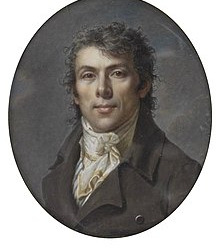
Self-portrait of Francois Dumont, a great miniaturist and good looking!
7 notes
·
View notes
Text

Miniature, 1794, French.
By Francois Dumont.
Portraying General Cartaux.
Musée des Arts Décoratifs Paris.
#mad paris#musée des arts décoratifs paris#1794#1790s#General cartaux#François dumont#miniature#1790s miniature#uniform#18th century#french#France#1790s france#portrait#first republic
7 notes
·
View notes
Text
FILMS
- Eric Rohmer, Le rayon vert
- Maurice Pialat, Nous ne vieillirons pas ensemble
- Agnès Varda, L’une chante, l’autre pas
- Claude Sautet, César et Rosalie
- François Ozon, Huit femmes
- Claude Lelouch, Un homme et une femme
- les frères Dardenne, La fille inconnue
- Christophe Honoré, Plaire, aimer et courir vite
- Bruno Dumont, La vie de Jesus
- Alain Guiraudie, l’Inconnu du lac
- Luca Guadagnino, Call me by your name
- Céline Sciamma, Bandes de filles
- Houda Benyamina, Divines
- Mia Hansen-Løve, Tout est pardonné
- Michael Hanneke, Amour
- Michel Gondry, Eternel Sunshine of the spotless mind
- Wong Kar-wai, My blueberries night
- David Lynch, Blue Velvet
- Ken Loach, La part des Anges
- Igmar Bergman, Persona
- Julio Medem, Los amantes del Círculo Polar
- Pedro Almodovar, La piel que habito
- Rita Azevedo Gomes, Correspondências
- Kleber Mendonça Filho, O Som ao Redor (les Bruits de Recife)
- Nanni Moretti, La stanza del figlio
- Asghar Farhadi, Une séparation
- Deniz Gamze Ergüven, Mustang
- Abbas Kiarostami, Le goût de la cerise
- Abdellatif Kechiche, La graine et le mulet
- Jonas Mekas, There is No Ithaca
5 notes
·
View notes
Photo
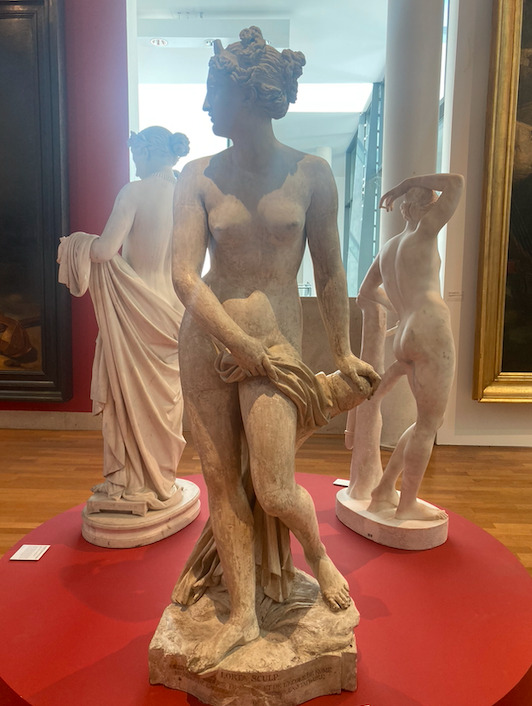
“Diane Surprise au Bain par Actéon" plâtre de Jean-François Lorta (1812), "Jeune Romaine à la Toilette" marbre d'Augustin-Alexandre Dumont (1843) et "Appollino de Florence" marbre de Georges Jacquot(1820-23) présentés dans les collections permanentes du Musée des Beaux-Arts de Nancy, juillet 2022.
3 notes
·
View notes